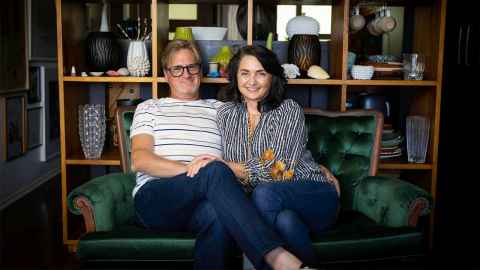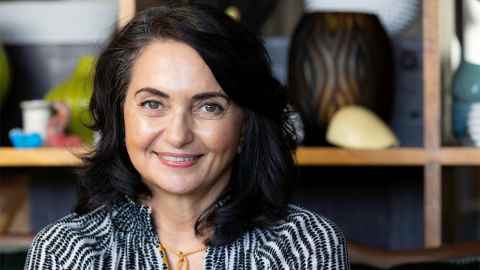Rosetta Allan: crystal-clear it's love
16 May 2022
Writer Rosetta Allan says a Creative New Zealand grant gave her the self-belief to keep writing. She and husband James say the grant also motivated the couple to help other writers, so they set up the Crystal Arts Trust.

What’s the secret to a long marriage? Rosetta and James Allan – married 37 years – give different answers when they’re asked this at parties.
James first gives a jokey soundbite worthy of his multi-award-winning advertising career: “Don’t complicate your relationship with love!”
And then, more seriously: “When was the last time you took your wife to a hotel and you were lovers?”
He recommends, among all the hard work, kids and business responsibilities, you say, “We’re going to run away and be lovers,” on a regular basis.
“Yes, we’ve always done that,” confirms Rosetta. But her answer to the question is not the same.
“There is no secret to a long marriage,” she says. “But we really do have a terrific love story. People would ask how we met, and I said, ‘James, I need to write this down’.”
I was a ward of the state, and you’re out on your own pretty quickly.
And so she did.
We can now all read about how this warm, candid couple met at a squalid boarding house in Napier in the early 1980s and escaped to marry at ages 19 and 21 – and about what’s happened since – in Crazy Love, Rosetta’s autobiographical third novel. Crazy Love was going to be all about the Robert Muldoon years (New Zealand prime minister 1975 to 1984), but ended up being all about romance. And loyalty. And heartbreak. A key section is based on a long manic period James experienced ten years ago due to then-undiagnosed bipolar disorder. For Rosetta, it was painfully isolating.
“I felt very alone because I didn’t understand what it was and I didn’t think anybody else would understand,” she says. “You’re too embarrassed to keep reaching out … so your world shrinks.”
She poured her heart out in a diary, which she rediscovered years later and used as source material for Crazy Love’s “snappier” fictional diary.
“At the time, I didn’t think it was funny because I was too sad. [But] some of the things that he was doing were laugh-out-loud moments,” she says.
When this disorder wants to rock up and play havoc, it’s horrible. So Rosetta deserves a medal. Good on you, Rosetta, for not giving up.
When James read Rosetta’s real diary, his first reaction was, “Nah, it’s fiction, there’s no way I would have done that!” He had no recollection of his actions.
“If that was me, then what a prick!” His voice breaks a little. “But I’m not a prick. But I did that! Well, you’re caught in that weird circle, aren’t you?”
When Rosetta asked James whether he would be comfortable if she let people know the novel is based on real life, he “went into a tailspin”.
“To be honest, it took me a few days to get my head around it,” he says.
“But it’s about separating the behaviour from the person because that’s not who I am. People who know me love me, I love my friends, I love my family, grandchildren, colleagues. But when this disorder just wants to rock up and play havoc, it’s horrible. So Rosetta deserves a medal. Good on you, Rosetta, for not giving up.”
The episode was a long time ago now. James now manages his disorder holistically with Rosetta’s help. And for Rosetta, acknowledging the real-life detail wasn’t hard.
“I feel people assess our marriage anyway so that doesn’t feel new,” she says. “It doesn’t bother me. I know what I want, I know what it is, what I need from it and what I choose.”
She chooses her Jimmy.
In the end, they went public in the hope it helps others facing mental distress – and since the novel’s launch (on the eve of the August lockdown), many people have contacted them both to say it has done just that.
“It has done an amazing job of touching hearts,” says James.
Rosetta’s own story is also remarkable.
Expelled at the end of fifth form, she dropped out of school as a result of an unstable, disruptive home life.
“I was a ward of the state, and you’re out on your own pretty quickly”.

Four decades later, she’s a successful, award-winning author of three novels and two poetry collections, with a Bachelor of Arts and a Master of Creative Writing from the University of Auckland under her belt. She loved studying: “The masters programme builds community, it’s just wonderful.”
She describes course director Associate Professor Paula Morris as a “powerhouse”.
“She’s so supportive of what I call her ‘chickies’ – she really does take them under her wing, and advocate for our work.”
Those published from Rosetta’s 2017 cohort include poet Heidi North and novelists Sonya Wilson, Amy McDaid, Pip McKay, Michael Wilson and international bestseller Rose Carlyle.
Rosetta herself had already published before joining the masters programme.
As Rosetta supports James, James also champions Rosetta. The way Rosetta tells it, James cajoled a well-known agent to look at her first prose manuscript – one can only imagine the agent’s delight when it turned out to be one of those rare things: well-written and sellable.
Purgatory is based on a story from Rosetta’s family tree: the 1865 murders of the Finnegans in Ōtāhuhu. Then came The Unreliable People, set mostly in Russia, for which Rosetta spent an “exciting and terrifying” gothic-winter residency at the Museum for Non-Conformist Art in St Petersburg.
She received $24,000 from Creative New Zealand for the residency and James marvels that the grant “changed Rosetta’s life, encouraged her, validated her, gave her faith to go out”.
This helped plant the idea of what is now the Crystal Arts Trust, which generously funds both a $5,000 scholarship and a $10,000 prize for the University of Auckland Master of Creative Writing, and this year sponsored the Ockham New Zealand Best First Book prizes.
The Crystal Arts Trust is a manifestation of the couple’s passion for the arts and, out of love, is named after Rosetta’s late dog Crystal – “my little heart”. Crystal’s skull sits in pride of place on Rosetta’s dark-stained wooden shelf, above where she does much of her writing.
Novel number four is on its way. James believes “as a team, one plus one is not two. You take James and Rosetta – one plus one is ten. It’s exponential what we can do together.”
Story by Janet McAllister
This feature first appeared in the Autumn 2022 edition of Ingenio.